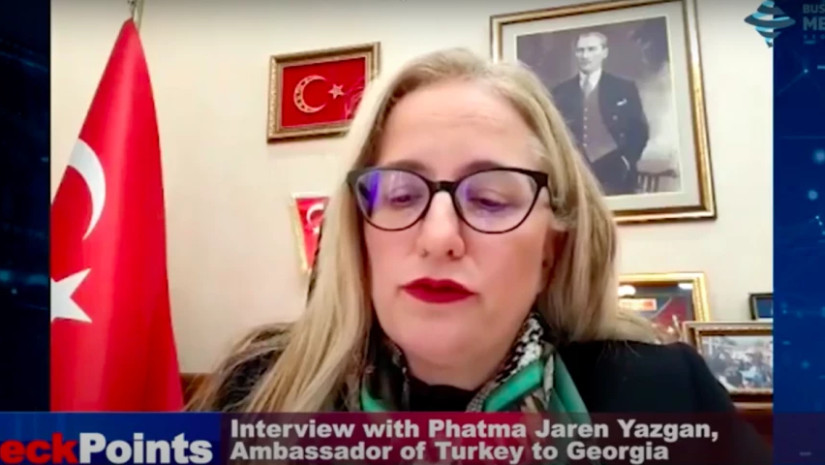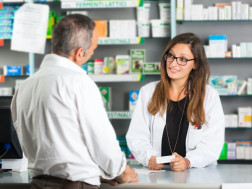Georgian Prime Minister Irakli Garibashvili spoke about pharmaceuticals prices at the first government meeting for 2022. As he emphasized government will open up the Turkish pharmaceutical market. BMG reached to Turkish Ambassador to Georgia, Fatma Ceren Yazgan in order to get more insights on the process and expectation.
Mrs Ambassador, is there any discussion between Turkish and Georgian authorities about the opening of Turkish pharmaceutical market? What's left to finalize this process and to start importing cheaper medicines from Turkey?
First of all, let me rephrase that the medicines from Turkey are not cheap, but they are more affordable when you compare to the prices with Georgia in certain instances. Last year the Ministries of Health of Turkey and Georgia had an intense conversation on a range of issues, and the cooperation on the provision of medical pharmaceutical products was one of them. In Turkey, we have a local production of medicines, but also we have distributors of international companies and of course, it's about licensing. Every government would like to control the quality of medicines and its affordability for the population. This issue came up a couple of years ago during previous prime minister's visits to Turkey. Then the pandemic started, but now, as prime minister Irakli Gharibashvili has announced, there is an intention of closer cooperation. Of course, pharmaceutical companies and Government of Georgia are those who have to talk about this. The licensing requirements, import requirements by Georgia and what are the expectations from the Turkish companies, why certain Turkish products are not able to be sold here as more affordable - these are the questions which we wanted our pharmaceutical companies to focus on in order to find out what we can do more as the Turkish government.
And we found out that it's not all about trade, so it's not about selling, but it's about selling what is required here. There is a need to make it more affordable for the citizens of Georgia so that they don't have to go to Turkey to buy them which is happening. In our embassy, there will be a meeting with the representatives of the Turkish pharmaceutical companies who are in Tbilisi. We would like to learn particular points of concern which we should address together with the Georgian government. The provision of medical needs is a hole. In Turkey, we have a system and certain subsidies from the government that makes the medical treatment as a whole more affordable for the Turkish citizens.
This is a crucial issue. We see this more than a trade issue between Turkey and Georgia. This is about our populations being healthy. When part of the population need medicine, they should not have to suffer just because they don't have money. Now on the trade part, we are going to find out which products, particularly essential medical products Turkish companies may be able to provide for Georgia. I think in the course of the next few months, we may be able to see more development on this issue. But of course, this is a public discussion as well in Georgia, which we are not a part of. We can work with the Ministry of Health of Georgia and of course, that involves the trade and the customs authorities.
How did Turkey manage to make medicines affordable for the population?
Local production and the Turkish pharmaceutical companies have developed a lot, so they are producing good quality medicine. There's a constant dialogue between the government and the pharmaceutical companies. Of course, it's not an easy dialogue because after all, the companies will have to sustain profits so that they continue research and developing new products. Oncological treatment is very expensive in Turkey. Some companies are producing them and some are importing. Government pays because in Turkey there are certain subsidies in terms of Social Security. And of course, that's a conversation between the government and the companies. I think that's what the Georgian government with the importers and distributors of pharmaceuticals needs to do. We will support our companies to be part of that conversation, and I think they will be. But there should be also fair competition, which means that when the Turkish companies export to Georgia, they should be on the same competition level with other countries who might be also exporting to Georgia. All that is an issue for the pharmaceutical companies to discuss with the authorities of Georgia.
It is also interesting if Turkey is ready to supply more affordable medicines to Georgia?
We're talking about medical companies in Turkey who are looking for ways to export to western markets as well. And of course, it's about quality. I can give you now the more or less the export numbers, which the Turkish pharmaceutical companies have already been exporting to Georgia. We can not say that you don't have Turkish medicines here, you have, but you could have more affordable, more variety and faster. These are 6-7 categories of medicines. It could be more and of course, a real market research is needed. That's not obviously Turkey's job to do that.
But we need to discuss why certain medicine has a big difference of price in Georgia and in Turkey. I think that is exactly what Prime Minister is saying. We are talking about why in Turkey we have lower prices, and here the same could be more. Let's see what is the reason of this price difference and how can we take it down? Again, I underline this is more than an issue of trade. This is about public health and about the health of our neighbors. It's why embassy is involved. Otherwise, the companies would be talking to other companies here or to Georgian government, but the embassy is involved because we believe that the Turkish pharmaceutical companies, while keeping their own profitability, still have the opportunity to be able to export to Georgia faster and more affordable products.
I would like to ask about the local production of medicines in Turkey, which is really highly developed. What advice will you have for Georgia in this regard? So what could Georgia learn from Turkey's approach to production and medicine prices?
I think it's a conversation that should be held between the ministries of health in a very systematic way, which will involve the whole system. So, pharmaceuticals is an area which was essential in Turkey when we started the reform of our health care system because we should not treat medical sector as just like a private sector activity, like selling biscuits or chocolate with rules of marketing sales that apply to a very capitalist approach. I'm a Social Democrat, so I might be also a little biased on this, but I do believe that the health sector, requires definitely first and foremost, the benefit of the public health. As I said before, every system needs to be adjusted and improved according to the new needs and requirements. For instance, the health issues changed the requirements for paying what sort of subsidies that the government should have or which sectors, what will be the base price when the import prices increase? How can you subsidize that without hurting the importers or the producers and the people? So this is a very complicated system.
And we look forward to that conversation as a whole and not only the pharmaceuticals, because it's about how do you prescribe medical needs, who puts the diagnosis, who verifies that, who verifies the prices, who verifies the user who informs the public about, for instance, use of antibiotics in Turkey. This was an issue. People bought antibiotics like sugar, so the government had to intervene and say: “No, you cannot buy antibiotics like candies from your pharmacies. You need to register. You need to have a prescription".














